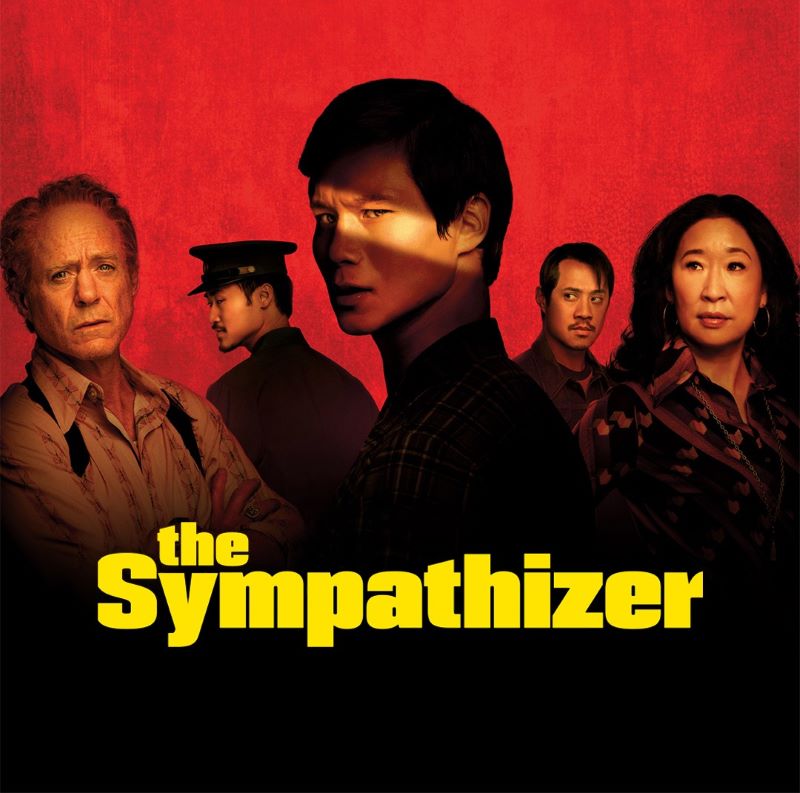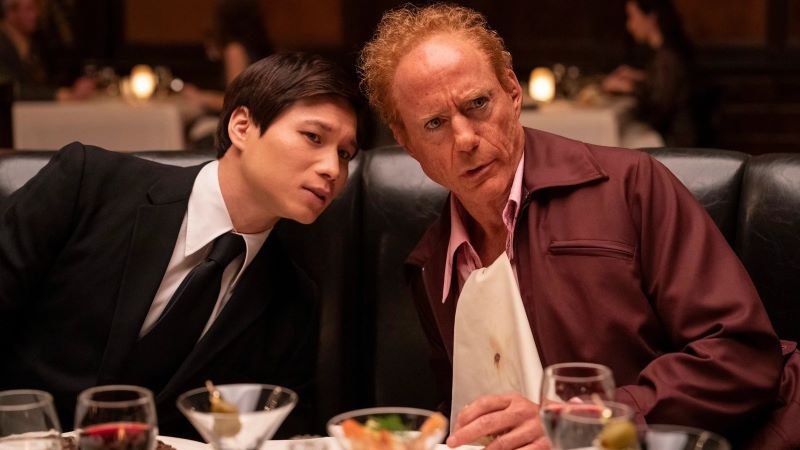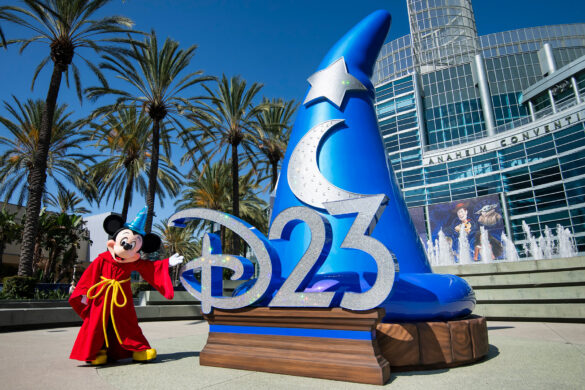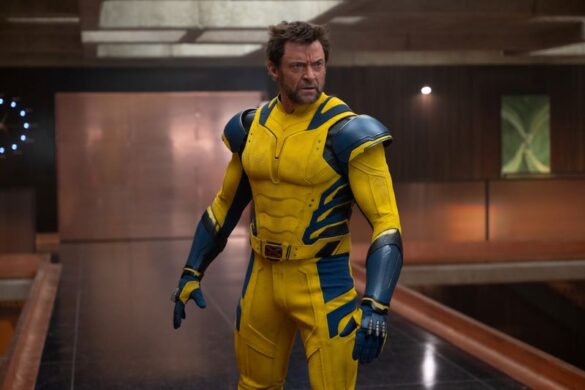Adapting a critically acclaimed and Pulitzer Prize-winning novel like Viet Thanh Nguyen’s “The Sympathizer” is no easy task. Yet, HBO and A24 seemed convinced they were up to the challenge of turning the page-turning espionage thriller into something worth watching. While Hoa Xuande’s role as The Captain is outstanding, the overall execution can’t match the ambition of the source material.

“The Sympathizer” is told from the viewpoint of an unnamed character who is known to the audience as The Captain (Xuande), a half-Vietnamese and half-French double agent who reports to the North Vietnamese while posing as an ally to the South Vietnamese community who were exiled to America and a CIA agent.
The series intricately explores the theme of duality, presenting The Captain as a character grappling with his multiple identities. He is a member of the Secret Police, yet he poses as a South Vietnamese sympathizer. He is biracial, raised in Vietnam but educated in the U.S. After the fall of Saigon, he assumes the role of a Vietnamese refugee in an America that perceives him as an outsider. This constant state of duality makes him a walking contradiction, blurring the lines between friend and foe, and patriot and traitor, a complexity that is sure to captivate the audience.
The themes of identity crisis make it more fascinating to watch, as the audience has to rely on an untrustworthy narrator, who is the only guide through this paradoxical odyssey. We see him as a political prisoner of North Vietnam writing out his confession to the Secret Police about everything he’s been up to before his capture. While Xuande does most of the heavy lifting by delivering an outstanding performance as The Captain, the actor is surrounded by a terrific supporting cast, most of whom have accolades to their name. Emmy Award winner Sandra Oh plays the Japanese American from Gardena, CA, Miss Mori. Fred Nguyen Khan plays The Captain’s childhood best friend, Bon. Though the two are seen as blood brothers early on in the series, Bon suffers a tragic loss when his wife and infant son are killed as they are trying to escape the country.
At the same time, the identity crisis starts to take shape as the series progresses beyond the three opening episodes directed by Park Chan-wook. The tonal shifts are jarring at best, which makes for a rather frustrating watch as it shows that the series doesn’t have cohesion. It’s not as though we haven’t seen multiple directors take on different episodes in a single season. Still, for something like “The Sympathizer,” it can go from a straight-up John le Carré inspired espionage thriller to a distracting madcap satire. And because there are three different creative visions at the helm, “The Sympathizer” can feel like three different identities are battling over control of what it wants to be.
Perhaps “The Sympathizer’s” most significant flaw is its approach to adapting the novel for the screen. Seven episodes aren’t enough to flesh out the nuances of Nguyen’s story entirely, and it’s hard to keep track of The Captain’s steps and his place within the confession that he is penning with nonlinear storytelling. Though an adaptive miniseries makes for a far more desirable entertainment digest because it bypasses all of the denser complexities and minutia of the original source material, the omissions of key subplots don’t do the original source material justice or get anyone interested in reading it. As a result, the final product is far more watered down and not nearly as engaging as a page-turning book like “The Sympathizer.”
However, a few constants keep it from falling apart entirely. Xuande is the glue that binds everything together. Though he is made out to be an unreliable narrator, one can’t help but empathize with a person who is simply trying to survive by any means necessary. Even if that means conspiring against allies, compatriots, friends, and enemies. Sometimes, it’s hard to tell which is which. The role requires the actor to be a walking contradiction exploring different dualities. So even though it can be a bit confusing at times, Xuande keeps things grounded when things get too chaotic, especially when it requires Downey Jr. to play one too many roles – sometimes within the same frame. The decision to have the Oscar-winning actor take on such a role(s) serves a dual purpose. One is to bring levity to a dense and complicated story about espionage. And yet, it can also be a very distracting gimmick, considering the actor has to amp up the inanity of all the characters and their colorful racist ideals to an 11. The other point is to spotlight how these figures are interchangeable, and the one thing they have in common is their sense of finding an opportunity to further their respective agendas by taking advantage of The Captain’s current position.
Though “The Sympathizer” doesn’t live up to its full potential because of the tonal consistencies and frustrating structure, it beautifully visualizes the themes of duality. Xuande, Khan, and Oh are all shining standouts, even if Downey Jr. and the multiple characters that he plays are at the center of the miniseries’ marketing. Still, the gimmick is not enough to overshadow the cast, nor is it a groundbreaking representation of having a cast that is Vietnamese or of Vietnamese descent in prominent roles. So even if “The Sympathizer” is flawed, to be able to have a specific community that tells their story through their words with the help of an international crew so that a worldwide audience can enjoy a satirical spy thriller is groundbreaking.
“The Sympathizer” airs every Sunday on HBO and is available to stream on Max.












1 comment
If you liked the Sympathizer and enjoy reading fact based espionage thrillers, of which there are only a handful of decent ones, do try reading Bill Fairclough’s Beyond Enkription. It is an enthralling unadulterated fact based autobiographical spy thriller and a super read as long as you don’t expect John le Carré’s delicate diction, sophisticated syntax and placid plots.
What is interesting is that this book is so different to any other espionage thrillers fact or fiction that I have ever read. It is extraordinarily memorable and unsurprisingly apparently mandatory reading in some countries’ intelligence agencies’ induction programs. Why?
Maybe because the book has been heralded by those who should know as “being up there with My Silent War by Kim Philby and No Other Choice by George Blake”; maybe because Bill Fairclough (the author) deviously dissects unusual topics, for example, by using real situations relating to how much agents are kept in the dark by their spy-masters and (surprisingly) vice versa; and/or maybe because he has survived literally dozens of death defying experiences including 20 plus attempted murders.
The action in Beyond Enkription is set in 1974 about a real maverick British accountant who worked in Coopers & Lybrand (now PwC) in London, Nassau, Miami and Port au Prince. Initially in 1974 he unwittingly worked for MI5 and MI6 based in London infiltrating an organised crime gang. Later he worked knowingly for the CIA in the Americas. In subsequent books yet to be published (when employed by Citicorp, Barclays, Reuters and others) he continued to work for several intelligence agencies. Fairclough has been justifiably likened to a posh version of Harry Palmer aka Michael Caine in the films based on Len Deighton’s spy novels.
Beyond Enkription is a must read for espionage cognoscenti. Whatever you do, you must read some of the latest news articles (since August 2021) in TheBurlingtonFiles website before taking the plunge and getting stuck into Beyond Enkription. You’ll soon be immersed in a whole new world which you won’t want to exit. Intriguingly, the articles were released seven or more years after the book was published. TheBurlingtonFiles website itself is well worth a visit and don’t miss the articles about FaireSansDire. The website is a bit like a virtual espionage museum and refreshingly advert free.
Returning to the intense and electrifying thriller Beyond Enkription, it has had mainly five star reviews so don’t be put off by Chapter 1 if you are squeamish. You can always skip through the squeamish bits and just get the gist of what is going on in the first chapter. Mind you, infiltrating international state sponsored people and body part smuggling mobs isn’t a job for the squeamish! Thereafter don’t skip any of the text or you’ll lose the plots. The book is ever increasingly cerebral albeit pacy and action packed. Indeed, the twists and turns in the interwoven plots kept me guessing beyond the epilogue even on my second reading.
The characters were wholesome, well-developed and beguiling to the extent that you’ll probably end up loving those you hated ab initio, particularly Sara Burlington. The attention to detail added extra layers of authenticity to the narrative and above all else you can’t escape the realism. Unlike reading most spy thrillers, you will soon realise it actually happened but don’t trust a soul.